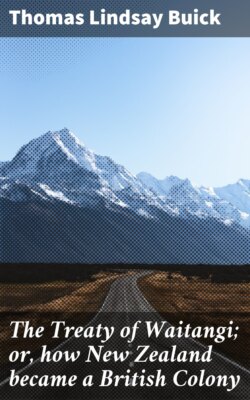Читать книгу The Treaty of Waitangi; or, how New Zealand became a British Colony - Thomas Lindsay Buick - Страница 11
На сайте Литреса книга снята с продажи.
FOOTNOTES
ОглавлениеTable of Contents
[28] This war, it is said, arose through some one on board the Roslyn Castle carrying off a native woman of high rank to sea. Her friends at Kawakawa accused the people of Kororareka of killing and eating her in satisfaction of an old feud. This they denied, but a war ensued, 1500 fighting men being engaged, the war continuing for several months, eighty being killed.
[29] In 1821 Mr. Henry Goulburn, by direction of Earl Bathurst, informed R. M. Sugden that his Lordship "did not feel he had any power of approving any particular encouragement to the establishment of a colony in New Zealand." In 1822 Earl Bathurst informed Thomas England and Messrs. Taylor and Upton that no encouragement was given by the Government to settlers to proceed to New Zealand. In the same year Mr. John Thomson, A.M., Edinburgh, offered to found a colony of 50 sober men, 100 Sepoys, and 100 convicts, as "the inhabitants of New Zealand are just in that state of civilisation to be made useful." In November 1823 Lieutenant-Colonel Nicolls, an ex-Indian officer, made a proposal to Earl Bathurst to establish a colony of military pensioners. In the following month Baron de Thierry's scheme was brought under the notice of the Government. The year 1825 saw the first New Zealand Company established. Colonel R. Torrens, who afterwards did such good work in South Australia, applied in 1826 for the command of a military force in New Zealand, and so enable him to "make preliminary arrangements which would facilitate the future colonisation of these islands upon sound economical principles."
[30] It was said that at one period of its existence the New Zealand Association could command 42 votes in the House of Commons.
[31] Lord Glenelg did not on this occasion urge as an objection that New Zealand was not a part of the British Empire.
[32] After the Association was formed into a Company Lord Howick became one of its most ardent supporters.
[33] A select Committee of the House of Lords was set up in 1838 "to enquire into the present state of the Islands of New Zealand and of the expediency of regulating the settlement of British subjects therein."
[34] "It was only within the last three months that I received a letter from Paisley, stating that if a colony were formed in New Zealand on the principles laid down in our publication in that neighbourhood alone there were a hundred respectable persons—indeed I am not sure the expression was not 'respectable families,' but I have not the letter with me—who would emigrate immediately" (Dr. Hinds before the House of Lords Committee). Mr. G. S. Evans, LL.D., in his evidence stated there was an Association in the West of Scotland consisting of 200 members, and another in the Carse of Gowrie consisting of at least 100 persons, all anxious to emigrate to New Zealand.
[35] Vide his letter to Lord Durham, December 29, 1837.
[36] "I was the principal founder of the Company and the principal Managing Director from the time of its formation till the summer of 1846, allowing for intervals of absence occasioned by illness and other occupation at a distance from England. My incapacity changed the whole character of the direction of the New Zealand Company's affairs, which then fell into the hands of a few persons in whose minds sound principles of colonisation and colonial government were as nothing compared with pounds, shillings, and pence."—Evidence of E. G. Wakefield before a New Zealand Parliamentary Committee on New Zealand Company's debt—Sessions 1 and 2.
[37] For the text of the above Memorandum I am indebted to Mr. R. M'Nab, who copied it from the original in the Record Office, London. Mr. Stephen, who wrote the Memorandum, was, at the time, an officer of the Church Missionary Society.
[38] Lord Normanby became Colonial Secretary on February 8, 1839.
[39] Vide his letter to Lord Palmerston, December 12, 1838.
